
Huey, Dewey, and Louie are triplet cartoon characters created by storyboard artist (screenwriter) Carl Barks for The Walt Disney Company from an idea proposed by cartoonist Al Taliaferro. They are the nephews of Donald Duck and the grand-nephews of Scrooge McDuck. Like their maternal uncles, the brothers are anthropomorphic white ducks with yellow-orange bills and feet. The boys are sometimes distinguished by the color of their shirts and baseball caps. They appeared in many Donald Duck animated shorts, as well as in the television show DuckTales and its reboot, but the comics remain their primary medium.

Pete is a cartoon character created by Walt Disney and Ub Iwerks of The Walt Disney Company. Pete is traditionally depicted as the villainous arch-nemesis of Mickey Mouse, and was made notorious for his repeated attempts to kidnap Minnie Mouse. Pete is the oldest continuing Disney character, having debuted in the cartoon Alice Solves the Puzzle in 1925. He originally bore the appearance of an anthropomorphic bear, but with the advent of Mickey in 1928, he was defined as a cat.

Goofy is an American cartoon character created by the Walt Disney Company. He is a tall, anthropomorphic dog who typically wears a turtle neck and vest, with pants, shoes, white gloves, and a tall hat originally designed as a rumpled fedora. Goofy is a close friend of Mickey Mouse and Donald Duck, and is Max Goof's father. He is normally characterized as hopelessly clumsy and dim-witted, yet this interpretation is not always definitive; occasionally, Goofy is shown as intuitive and clever, albeit in his own unique, eccentric way.

The Mickey Mouse universe is a fictional shared universe which is the setting for stories involving Disney cartoon characters, including Mickey and Minnie Mouse, Donald and Daisy Duck, Pluto and Goofy as the primary members, and many other characters related to them, being most of them anthropomorphic animals. The universe originated from the Mickey Mouse animated short films produced by Disney starting in 1928, although its first consistent version was created by Floyd Gottfredson in the Mickey Mouse newspaper comic strip. Real-world versions also exist in Disneyland and Tokyo Disneyland, called Mickey's Toontown.
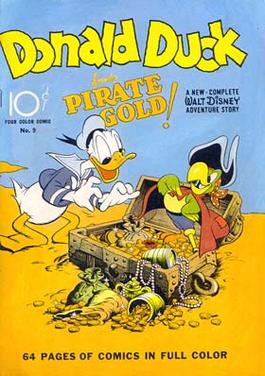
"Donald Duck Finds Pirate Gold" is a Disney comics story starring Donald Duck that was originally printed in Four Color #9 in October 1942. The script was by Bob Karp and illustrated by Carl Barks and Jack Hannah. The story is significant for launching the first American Donald Duck adventure comic series, and for being Barks' first duck comics work.
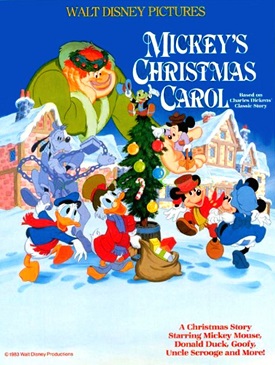
Mickey's Christmas Carol is a 1983 American animated Christmas fantasy featurette directed and produced by Burny Mattinson. The cartoon is an adaptation of Charles Dickens's 1843 novella A Christmas Carol, and stars Scrooge McDuck as Ebenezer Scrooge. Many other Disney characters, primarily from the Mickey Mouse universe, as well as Jiminy Cricket from Pinocchio (1940), and characters from The Adventures of Ichabod and Mr. Toad (1949) and Robin Hood (1973), were cast throughout the film. The featurette was produced by Walt Disney Productions and released by Buena Vista Distribution on December 16, 1983, with the re-issue of The Rescuers (1977). In the United States, it was first aired on television on NBC, on December 10, 1984.

Fun and Fancy Free is a 1947 American animated musical fantasy anthology film produced by Walt Disney and Ben Sharpsteen and released on September 27, 1947 by RKO Radio Pictures. The film is a compilation of two stories: Bongo, narrated by Dinah Shore and loosely based on the short story "Little Bear Bongo" by Sinclair Lewis; and Mickey and the Beanstalk, narrated by Edgar Bergen and based on the "Jack and the Beanstalk" fairy tale. Though the film is primarily animated, it also uses live-action segments starring Edgar Bergen to join its two stories.
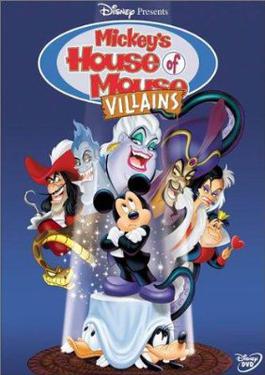
Mickey's House of Villains is a 2002 American direct-to-video animated comedy-horror film produced by Walt Disney Television Animation. It is based on the animated television series House of Mouse and serves as a stand-alone sequel to the direct-to-video animated film Mickey's Magical Christmas: Snowed in at the House of Mouse, starring Mickey Mouse, Donald Duck, Minnie Mouse, Goofy, Daisy Duck, and Disney Villains that appeared in past Disney productions. It was released on both VHS and DVD by Walt Disney Home Entertainment on September 3, 2002.

Mickey's Trailer is a 1938 American animated short film produced by Walt Disney Productions and released by RKO Radio Pictures. The cartoon stars Mickey Mouse, Donald Duck, and Goofy on a near disastrous road trip in a travel trailer. It was directed by Ben Sharpsteen and features the voices of Walt Disney as Mickey, Clarence Nash as Donald, and Pinto Colvig as Goofy. Animators include Ed Love, Louie Schmitt, Johnny Cannon, Don Patterson, Clyde Geronimi, Tom Palmer, Frenchy de Trémaudan and Cy Young. Pete makes a cameo in this cartoon where he is seen driving a truck during the "Runaway Trailer" sequence featuring Mickey Mouse and Donald Duck. This cartoon was released about five months after Snow White and the Seven Dwarfs. It was the 100th short in the Mickey Mouse film series to be released, and the second for that year.
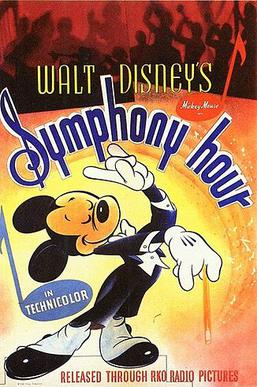
Symphony Hour is a 1942 American animated short film produced by Walt Disney Productions and released by RKO Radio Pictures. The cartoon depicts Mickey Mouse conducting a symphony orchestra sponsored by Pete. The film was directed by Riley Thomson and features music adapted from the "Light Cavalry Overture" by Franz von Suppé. The voice cast includes Walt Disney as Mickey, Billy Bletcher as Pete, and John McLeish as a radio announcer. It was the 117th short in the Mickey Mouse film series to be released, and the second for that year.

Mickey, Donald, Goofy: The Three Musketeers is a 2004 American animated direct-to-video musical adventure film based on the film adaptations of the 1844 novel The Three Musketeers by Alexandre Dumas and the Mickey Mouse film series by Walt Disney and Ub Iwerks. As the title suggests, it features Mickey Mouse, Donald Duck, and Goofy as the three musketeers in their first full-length feature film together. This film was directed by Donovan Cook, produced by Walt Disney Pictures and the Australian office of DisneyToon Studios. It was released directly to VHS and DVD on August 17, 2004, by Walt Disney Home Entertainment, and was later re-released on Blu-ray Disc on August 12, 2014, coinciding with the film's 10th anniversary. The film received mixed to positive reviews from critics, who praised its musical numbers, action sequences and faithfulness to the original material, but were mixed on certain aspects and elements.
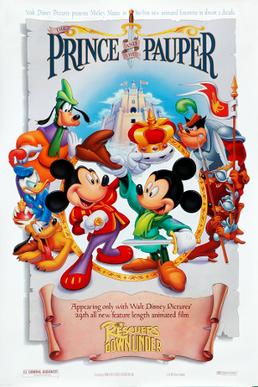
The Prince and the Pauper is a 1990 American animated comedy action-adventure featurette produced by Walt Disney Feature Animation and directed by George Scribner. Featuring the voice of Wayne Allwine as Mickey Mouse, it is inspired by Mark Twain's 1881 novel of the same name. It was Disney's final use of the traditional ink-and-paint and camera process for a theatrical product, before the CAPS digital-ink-and-paint process rendered the traditional techniques and equipment obsolete. Some objects, such as the carriage, were created on computers before being printed out on paper and photocopied onto animation cels. The animation was given a watercolor look and based on Disney's style from the late 30s, influenced by Fred Moore.
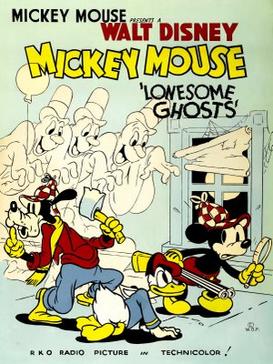
Lonesome Ghosts is a 1937 Disney animated cartoon, released through RKO Radio Pictures on Christmas Eve, three days after Snow White and the Seven Dwarfs (1937). It was directed by Burt Gillett and animated by Izzy (Isadore) Klein, Ed Love, Milt Kahl, Marvin Woodward, Bob Wickersham, Clyde Geronimi, Dick Huemer, Dick Williams, Art Babbitt, and Rex Cox. The short features Mickey Mouse, Donald Duck & Goofy as members of The Ajax Ghost Exterminators. It was the 98th short in the Mickey Mouse film series to be released, and the ninth for that year.
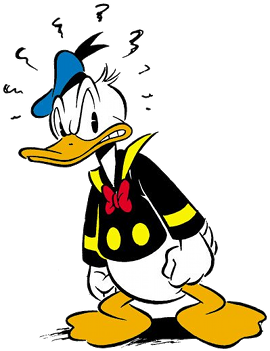
Donald Duck is a cartoon character created by The Walt Disney Company. Donald is an anthropomorphic white duck with a yellow-orange bill, legs, and feet. He typically wears a sailor shirt and cap with a bow tie. Donald is known for his semi-intelligible speech and his mischievous, temperamental, and pompous personality. Along with his friend Mickey Mouse, Donald was included in TV Guide's list of the 50 greatest cartoon characters of all time in 2002, and has earned a star on the Hollywood Walk of Fame. He has appeared in more films than any other Disney character.

Mickey's Amateurs is a 1937 American animated short film produced by Walt Disney Productions and released by United Artists. Originally entitled Mickey's Amateur Concert during production, the cartoon depicts an amateur talent show hosted by Mickey Mouse. It was the 94th short film in the Mickey Mouse film series, and the fifth for that year. It was co-directed by Pinto Colvig, Erdman Penner, and Walt Pfeiffer, and features original and adapted music by Oliver Wallace. The voice cast includes Walt Disney as Mickey, Clarence Nash as Donald Duck, Florence Gill as Clara Cluck, and Pinto Colvig as Pete and Goofy.
"Halloween Hall o' Fame" is a 1977 Halloween-themed episode of The Wonderful World of Disney which originally aired on October 30, 1977.

Moving Day is a 1936 American animated short film produced by Walt Disney Productions and released by United Artists. The cartoon, set during the contemporary Great Depression, follows the antics of Mickey Mouse, Donald Duck, and Goofy as they frantically pack their belongings after being dispossessed from their home. The film was directed by Ben Sharpsteen and includes the voices of Walt Disney as Mickey, Clarence Nash as Donald, Pinto Colvig as Goofy, and Billy Bletcher as Sheriff Pete. It was the 85th Mickey Mouse short to be released, and the eighth of that year.
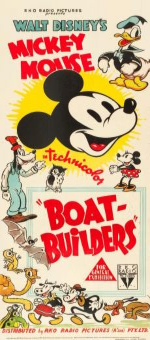
Boat Builders is an animated short film produced by Walt Disney, distributed by RKO Radio Pictures and released on February 25, 1938. The film was directed by Ben Sharpsteen and animated by Frenchy de Trémaudan, Louie Schmitt, Chuck Couch, Eddie Strickland, Clyde Geronimi, Paul Satterfield, Archie Robin, Don Patterson. It was the 99th short in the Mickey Mouse film series to be released, and the first for that year.

Mickey's Fire Brigade is a 1935 American animated short film produced by Walt Disney Productions and released by United Artists. The cartoon stars Mickey Mouse, Donald Duck, and Goofy employed as firefighters responding to a hotel fire. It was directed by Ben Sharpsteen and features the voices of Walt Disney as Mickey, Clarence Nash as Donald, Pinto Colvig as Goofy, and Elvia Allman as Clarabelle Cow. It was the 77th Mickey Mouse short to be released, and the sixth of that year.

Mickey's Service Station is a 1935 animated short film produced by Walt Disney Productions and released by United Artists. The film, which stars Mickey Mouse, Donald Duck, and Goofy as car mechanics, was also the final black-and-white appearance of Donald, Goofy, and Pete and the penultimate animated black-and-white film produced by Disney after Mickey's Kangaroo which was released later the same year. It was also the first team-up of the classic trio of Mickey, Donald, and Goofy. Mickey's Service Station was directed by Ben Sharpsteen, who at the time had directed only Silly Symphony shorts, and starred the voices of Walt Disney, Clarence Nash, Pinto Colvig, and Billy Bletcher. It was the 74th Mickey Mouse short film to be released, and the third of that year.